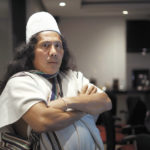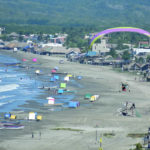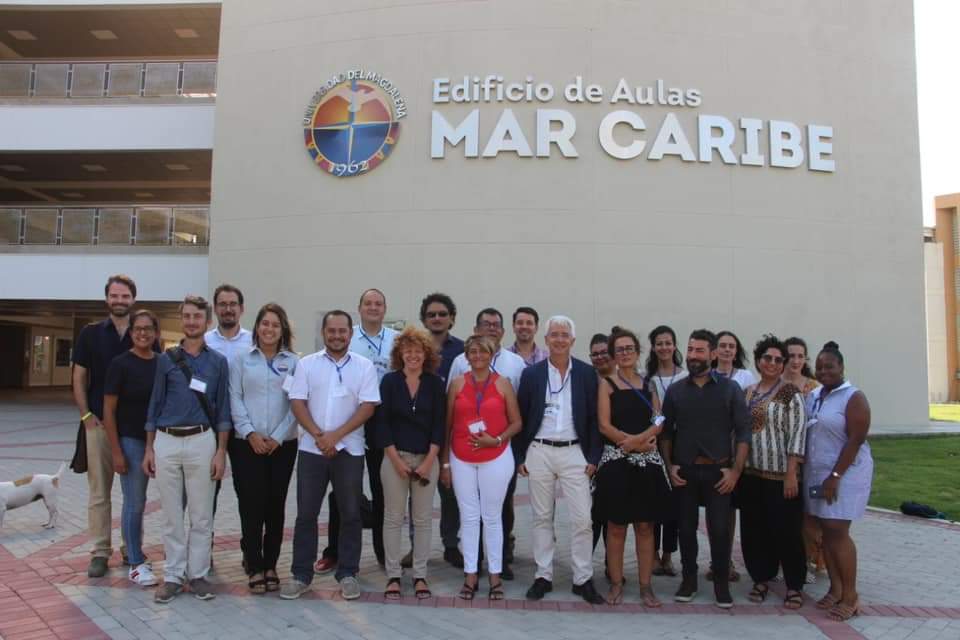From the 5th to 10th of December 2019, the University of Magdalena in Santa Marta, Colombia, hosted a capacity building workshop with partners of the Storem project and local stakeholders. The goal of the workshop was to have capacity building sessions and dissemination activities of the project. The workshop was chaired by Doctor Pablo Vera Salazar, Rector of this Institution; Dr. Anna Pinna, professor at the University of Cagliari in Italy, coordinator of the STOREM Project; and the magister engineer Mario Socatelli, director of the National Regulatory Commission of Tourism of Costa Rica. The event also had the participation of international experts, who spoke about regenerative tourism; public policies on sustainable tourism and resource management; among other related topics.
Within the framework of the academic agenda, a working session was also held with potential students of the future postgraduate program, including vulnerable populations such as displaced persons, Afro-Colombians, indigenous people, disabled people, and directors and teachers of the Tourism Programs of UNIMAGDALENA, together with to members of the international project and representatives of the productive sector, in four working groups with the purpose of continuing to build together and identify possible lines of research and subjects related to the curriculum, seeking to generate an impact on the tourism education of the department and the country.
Master political scientist Carlos Coronado Vargas, head of the International Relations Office of this House of Higher Studies, leader of the project’s quality management, referred to the Master’s process, “we are in a process that we started this year, we have involved several actors since it is an interdisciplinary master’s degree, therefore we have three faculties involved in its design and development. I think the construction is going very well, the first version has advanced significantly. We will have a meeting next week as soon as the visit of our colleagues is over, to review progress; the idea and the objective is that in the middle of 2020 we will have the document ready and that by 2021 we will have the offer of the master’s degree in order for the different candidates to enroll in it”.
This commitment to the generation of new skills in sustainability issues occurs in search of the socioeconomic development of the region, and will equip academics, tourism professionals and administrations, in order to prioritize the management of environmental resources and sustainable tourism.
The workshop activities had the important participation of representatives of the participating Universities from Italy, France, Costa Rica, Barbados and Colombia; as well as indigenous people, businessmen, and, members of city institutions and the department in general; integrating multidisciplinary learning and research experience on sustainability issues of HEIs in the European Union with the experience of universities in the Latin American and Caribbean region.
Dr. Anna Pinna, coordinator of STOREM, highlighted the location and inclusion policies of UNIMAGDALENA as vital pillars for the Project, “an important point is the location of the Universidad del Magdalena, we are in the Caribbean, an optimal and strategic point for address these issues of sustainable tourism; Magdalena still has a lot to exploit, there is a lot of field to learn and to share knowledge. In addition, another important point is that, by statutes and internal policies of the Universidad del Magdalena, the inclusion of people in vulnerable conditions is contemplated, and, for the coordination of the project, this was very attractive, it is very important, because it is a key point in the development of the project, then having an ally with these characteristics was vital”.
The event also included a media tour to disseminate the activities of the project and the foreseen development of the Master’s program. On Dec. 6, a public seminar on sustainable tourism and resource management was held, in which external stakeholders, indigenous representatives, students, alumni, faculty members and staff from UniMagdalena, discussed the challenges and future of sustainable tourism along with presentations of external and local experts. There was also an eco-touristic activity in which the members of the project and representatives from UniMagdalena visited a coffee farm and learned about the coffee making process. The workshop culminated with 2 days of capacity building, in which each partner made a presentation on the topic of their expertise.
Sources: Noticias UniMagdalena
https://www.unimagdalena.edu.co/presentacionPublicacion/VerNoticia/72687
Sources: El Informador
https://www.elinformador.com.co/index.php/sociales/54-entretenimiento/219783-unimagdalena-le-apuesta-al-turismo-sostenible-y-a-la-gestion-ambiental






